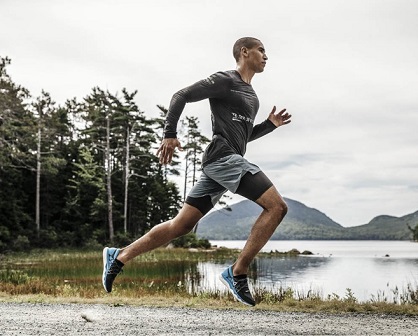 Apparel Tips
Apparel Tips
- Wear spandex shorts under your regular running shorts so you don’t chafe “down there.”
- Cotton socks will only lead to blisters; invest in socks designed for running.
- Ladies, do not skimp on a bra. Even if it costs more than your shoes it’s still a bargain.
- Buy running clothes you look good in and that will motivate you to run.
- Buy new running clothes at the end of the season when stores dump the old season’s line. Think clearance!
Community
- Join your local running club—check with your local running store fitness center and/or recreation department to find one.
- Volunteer at a local race—meet runners support runners and connect with your Community.
Manners
- Remember to say “Thank You!” to race volunteers (e.g. when you get that cup of water at the aid station) and family and friends who support you.
- Conscientiously share the trail with walkers, bikers and other runners.
- Always try to balance running with the people you love by making a schedule that involves and is considerate of everyone.
- Don’t carry loose change. It will annoy those who are running with you.
- Don’t neglect and irritate your family and friends by spending all your time running and talking about running.
Motivation Tips
- Sign up for a race as soon as you feel up to it.
- Find a committed running partner. It is much harder to skip a run when you have someone else depending on you.
- Remember that you will have plateaus in your progress and tough days along the way.
- It gets easier.
- Accept and appreciate the fact that not every single run can be a good one.
- Be prepared to remove the words “can’t” and “never” from your vocabulary.
- “Do not compare yourself to others. Run within yourself and for yourself first.
- Don’t expect every run to be better than the last one; some of them will hurt.
- Don’t think too much about it or you won’t do it.
- Even a bad run is better than no run at all.
- If you normally run with music try skipping it and listening to your feet to hear your pace and your gait.
- Don’t be discouraged if you don’t experience weight loss immediately.
- Start a running blog and read other running blogs regularly.
- Running is not an excuse to triple your intake of doughnuts because runners gain weight too.
Nutrition Tips
- Buy the powdered sports drink mix instead of premixed. It’s cheaper and more similar to race drink mixes.
- Each pound you lose makes running a little easier.
- Hydrate. Make it a habit of drinking water throughout the day.
- If you are running very long distance drink enough electrolytes (e.g. Gatorade).
- On long runs eat something every hour—whether you feel like it or not.
- During longer runs, if you don’t like to carry water take some cash in your pocket pouch or a shoe wallet. Run a route where there’s a corner store that you can use as a pit stop to pick up your water and maybe use the bathroom.
- Avoid eating spicy foods before running and the night before your long runs.
- To aid recovery the most crucial time to eat and drink is in the hour immediately after you run.
Prevention Tips
- Use Vaseline or BodyGlide wherever things rub. They will help prevent blisters and chafing (guys don’t forget the nipples).
- Do not increase your mileage more than 10 percent per week.
- Guys: Band-Aids before the long runs. Your nipples will thank you in the shower afterward.
- Log your mileage for your legs and your Shoes. Too much on either will cause you injury.
- If you are prone to shin splints and lower leg pain tries running soft trails for your Training runs and save the asphalt for race day.
- Do not run two hard days back-to-back.
- Ice aches and pains immediately.
- Pay attention to your form. Try to run lightly to minimize the impact that could lead to injury.
- Cut your Training by at least 30 percent to 50 percent every 4th or 5th week for recovery.
- When trail running doesn't forget the bug spray.
- Neosporin (or another antibiotic cream) is good for chafed areas (if you didn’t use your BodyGlide!).
- Make sure you cut your toenails short enough so they don’t jam into your Shoes!
- Put some BodyGlide between your toes on long runs.
- Be careful about running on paths that force you to run consistently on a slant. It’s hard on the hips knees and IT bands.
- Don’t stretch before a run. Warm up by walking briskly or jogging slowly for several minutes.
- Do not ice for more than 20 minutes at a time.
- Do not use the hot tub after a race. It will increase inflammation and hinder healing.
- Frozen peas make a great ice pack for aches and pains. A thin t-towel wrapped around them makes the cold more comfortable.
Racing Tips
- Race day is not the day to try new shoes, eat new foods, or wear brand new clothing.
- Do not try a marathon as your first race.
- For races longer than 5k start out slower than you think you should.
- If you conserve your energy during the first half of a race, you can finish strong.
- When you pick up drinking cups at aid stations, squeeze gently so it folds slightly and is easier to drink from it while you are moving.
- A plastic garbage on race day is a very fashionable cheap disposable raincoat.
Safety Tips
- Be aware of cyclists approaching you from behind and try to keep to the right. Try to pay special attention when running with music.
- Run facing traffic.
- Never assume a car sees you.
- Give horses wide berths on trails and walk as you pass them unless you enjoy a hoof to the melon.
- Always carry I.D. because you just never know.
Shoe Tips
- Try shoes on in the afternoon when your feet are bigger.
- Doubleknot your shoe laces so they will not come undone when you run.
- Buy yourself some actual running shoes from an actual running store because running in junk “sneakers” will destroy your feet and your legs.
- Get assessed for the right kind of running shoes.
Training Tips
- In the immortal words of Walt Stack famed senior-citizen distance runner “Start slow … and taper.”
- At first, keep your runs short and slow to avoid injury and soreness so you do not quit.
- If you are breathing too hard slow down or walk a bit until you feel comfortable again.
- Pick your route close to home (out your front door)—the more convenient it is the better chance you will have to stick with it.
- Find a beginner training plan for your first race.
- Set realistic short term and long term goals.
- Keep a training diary.
- Soreness one to two days after a run is normal (delayed onset muscle soreness).
- No amount of money spent on gadget training programs or funny food can substitute for minutes, hours, days and weeks on the road.
- There’s no shame in walking.
- Subscribe to a running magazine or pick up a book or two on running.
- Four laps around the local the high school track equals one mile.
- Lift weights.
- It’s okay to take walk breaks (run 1 minute walk 1 minute then progress to run 10 minutes walk 1 minute etc.).
- Vary your training routes. This will prevent boredom and prevent your body from getting acclimated.
- Speed work doesn’t have to be scientific. Try racing to one light post and then jogging to the next.
- Push through rough spots by focusing on the sounds of your breath and feet touching the ground.
- Do speedwork after you develop an endurance base.
- Practice running harder in the last half of your runs.
- Do abdominal breathing to get rid of side cramps or “stitches.”
- If you can’t find the time to run, take your running gear to work.
- Run on trails if at all possible. It will be easier on your body and you’ll love it.
- Build rest into your schedule. Rest is just as important of an element as an exercise in your fitness plan.
- Forgive yourself. Over-ambitious goals usually lead to frustration and giving up on your fitness plan. If you miss a goal or milestone let it go and focus on the next opportunity to get it.
- Mix-up your training plan. Make sure your training plan is not too heavily focused on one thing. No matter what level of runner you are your training plan should include four essential elements: endurance speed rest cross-training.
Weather Tips
- Dress as if it is 10 degrees warmer than the temperature on the thermometer.
- Wear sunscreen and a hat when the sun is beating down—even in winter.
- Run early in the morning or later in evening to avoid the mid-day heat.
- Pick up a pair of Yaktrax when running in icy conditions.
- In the winter dress in layers (cool-max or other technical clothing) and wear a headband over your running hat to cover your ears.
- For colder climates invest in socks rated to 40 below (usually found in sport/ski shops).
- To keep cool in hot weather soak a bandana in cold water wring it out a bit and tie it loosely around your neck.
- For hot weather fill your water bottle about half way lay it at an angle in the freezer and just before you head out for your run top it off with more water.

Founder of Lazarus Enterprises Group and head of strategy at Apex Media 365, also Apex Marketing Pro, a leading digital marketing firm.
We developed a system to help small businesses, and local companies connect with potential clients, and customers who truly need their goods or services, which will in-turn increase the company’s net worth with a lot more ease, and control.
We do this utilizing Gorilla marketing tactics, and technology to measure a return on investment.
To schedule a free 30-minute Marketing Tune-up, call us: 1-888-256-4202
